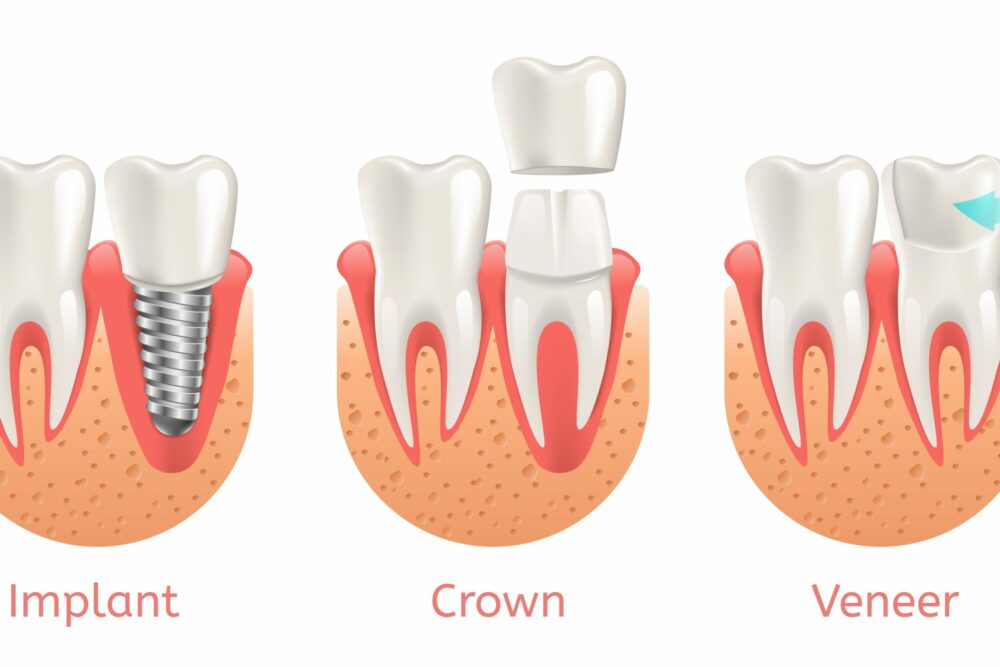
January 13, 2023
Veneers vs. Crowns vs. Implants: Which is Right for You?
If you are exploring options to restore lost or damaged teeth, here is an informative overview describing the differences, applications, and benefits of three common dental procedures: veneers, crowns, and implants.
Do you have one or more teeth that are damaged or missing? You are not alone—but fortunately, most problems are easily correctable by an experienced dentist. In fact, it is very common for people to seek tooth restoration procedures. If you have a chipped tooth, extensive decay, discolouration, missing teeth, or gaps you would like to correct, you may benefit from getting dental veneers, crowns, or implants. But what is the difference between them, and which is the ideal solution for you?
This article explains the most common applications for each of these treatments, their advantages and disadvantages, and what each procedure involves to help you and your dentist determine the best option for your specific situation.

What is the difference between veneers, crowns, and implants?
While dental veneers, crowns, and implants are all dental restoration solutions, each is a distinct procedure with different applications. Your unique dental issues, oral health history, and budget are contributing factors that your dentist will consider to help you to decide which of these procedures is the best option to restore your healthiest, most confident smile.
Dental Veneers
A dental veneer is a thin layer of either composite resin or all ceramics that is bonded to the tooth’s surface using special cement. Veneers may be used to cover chipped teeth, close gaps, disguise noticeable discolouration, improve mild to moderate alignment issues, and generally improve the aesthetics of your smile.
Dental veneers made of composite resin, also called “direct” veneers, can be a bit simpler to apply (usually in one office visit). Veneers made of all-ceramics (“indirect”), which is the material of choice at Tuxedo Dental Group, are custom-fabricated to match your tooth dimensions and colouring; they tend to be more durable, stain-resistant, and esthetic.
Advantages of dental veneers:
- Relatively quick treatment, usually applied in one or two appointments
- Can appear very realistic and natural-looking
- Require minimal removal of tooth surface
Disadvantages of dental veneers:
- More difficult to apply to badly damaged teeth
- May not completely cover severe discolourations
- Generally do not protect against further decay
Your dentist will determine if you are a candidate for veneers based on your specific needs and condition of your teeth.
Dental Crowns
A dental crown is a method of restoring a tooth that has been badly damaged by decay or fracture (so it can no longer hold a filling) or following a root canal (endodontics) procedure. A custom-molded cap is created to fit over and around an existing cracked or compromised tooth to hold, strengthen, and protect it from further decay, while matching the contours and colour of your original tooth. Made from all ceramics, porcelain fused to metal alloys (PFM), or a metal or gold alloy, crowns may be applied to an existing tooth or serve as a prosthetic tooth for a dental implant assembly or bridge.
Advantages of dental crowns:
- May be able to restore severely compromised teeth
- Can help preserve and protect damaged teeth from further decay
- By themselves are less invasive than a dental implant procedure
- Good option for severely discoloured and damaged teeth
Disadvantages of dental crowns:
- Requires some tooth structure reduction for proper placement
- Can be more costly than conventional fillings
Tuxedo Dental Group’s modern, state-of-the-art clinic has its own on-site laboratory to custom-design and fabricate properly-fitting crowns, while our professional team has many years of expertise in advanced dental procedures.
Dental Implants
A dental implant is a method of inserting an artificial tooth root into the jawbone to anchor a prosthetic tooth (crown) and maintain the face’s anatomical shape. The implanted root is typically made from titanium, and serves as the base for the crown that sits on top of it, which makes this a resilient, long-lasting option for replacing missing teeth, filling gaps, and addressing other serious issues. Dental implants are created with durable materials and construction to mimic the look and function of natural teeth and are designed to be a permanent solution.
Advantages of dental implants:
- Replaces missing teeth maintaining face, bone, and gum tissue structures
- Custom-made for your unique bite and tooth appearance
- Typically a long-lasting or permanent solution for tooth loss
- May be used for single or multiple missing teeth (fixed bridge or removable denture)
- Can be an excellent option to stabilize loose dentures
Disadvantages of dental implants:
- Sometimes requires multiple stages over several months
- Dental implants can be more costly and/or invasive than other options
- Some patients may not be good candidates for implants due to certain underlying health issues
Dental implants are often found to be the most appropriate treatment for patients with advanced dental issues that cannot be addressed by veneers or crowns alone. At Tuxedo Dental Group, your implant team will develop and explain the entire treatment plan so you are comfortable with this procedure from start to finish.
When is it better to get dental veneers?
If you wish to correct minor problems like stains, chips, or gaps, dental veneers can be a good option to make impactful cosmetic fixes to your teeth. The procedure to apply veneers is generally simpler than the procedures associated with crowns or implants. Dental veneers may also be a more affordable alternative to dental crowns or implants, depending on the situation.
When is it better to get dental crowns?
Crowns can be used to restore cracked teeth, protect damaged teeth from further decay, or to preserve teeth following a root canal. They may also help correct cosmetic issues such as gaps between teeth, discolouration, or differences in tooth height or texture. Crowns are often presented as a solution to fix teeth requiring more extensive repair than veneers can address. They may also be included as a component of dental implants to create permanent prosthetic teeth.
When is it better to get dental implants?
Dental implants are an excellent solution when an entire tooth (or several teeth), needs to be replaced due to severe damage or decay, advanced periodontal disease, or recurring infections. Implanted teeth are long-lasting and typically serve as a fully functional replacement for a natural tooth. Dental Implants are also an excellent way to stabilize loose dentures.
What is involved in each procedure?
Each of the restorative dental options presented in this guide has a distinct process and timeframe. Understanding what each procedure entails may help the decision-making process with your dentist so you can both determine which solution is right for your particular situation.
- Dental Veneers: The procedure for veneers is the simplest of the three cosmetic dental options. Tuxedo Dental Group often recommends the application of all-ceramic veneers, which are custom-made in our on-site lab. Typically, veneers can be placed over the course of two appointments. During the first appointment, our team may take X-rays, scans, and measurements of your teeth and jaw so they can accurately design your veneers. This might involve some minor adjustments to your teeth. At the second appointment, the dentist will fit the veneers and bond them in place using a special cement. Once the cement is spot set with a light curing unit, you are free to go home!
- Dental Crowns: This procedure typically starts with X-rays, scans, and molds of your teeth, to ensure that the final result mimics your existing tooth as closely as possible. Your dentist may need to trim or file the surfaces of your filling or tooth before measuring, for the utmost precision. Patients receive a temporary crown until the permanent crown is ready. At Tuxedo Dental Group, we carefully fabricate your dental crown in our on-site lab to be the same size and contour of your original tooth and attach it using a strong dental cement. Depending on each individual situation, the entire dental crown process is sometimes completed in a single day or may take more than one visit.
- Dental Implants: Placing a dental implant is a process that involves several steps. First, the dentist will insert a titanium post into your jaw to form an artificial root for your prosthetic tooth (crown). Once the bone has healed sufficiently, your dentist will place an abutment on the implant, which will hold the permanent crown, bridge, or removable denture in place.
How do you choose between veneers, crowns, or implants?
If you are unsure which restorative dental procedure might be the right choice for your situation, the expert dentists at Tuxedo Dental Group can help you decide. We will explain your options, discuss recommended treatments, and answer any questions you may have. Click here to book a consultation and take the next step toward your most confident smile!
Book Your FREE Consultation Today!
To book an appointment for a cleaning, a specific concern or even a friendly consultation fill in the following and we will contact you promptly.